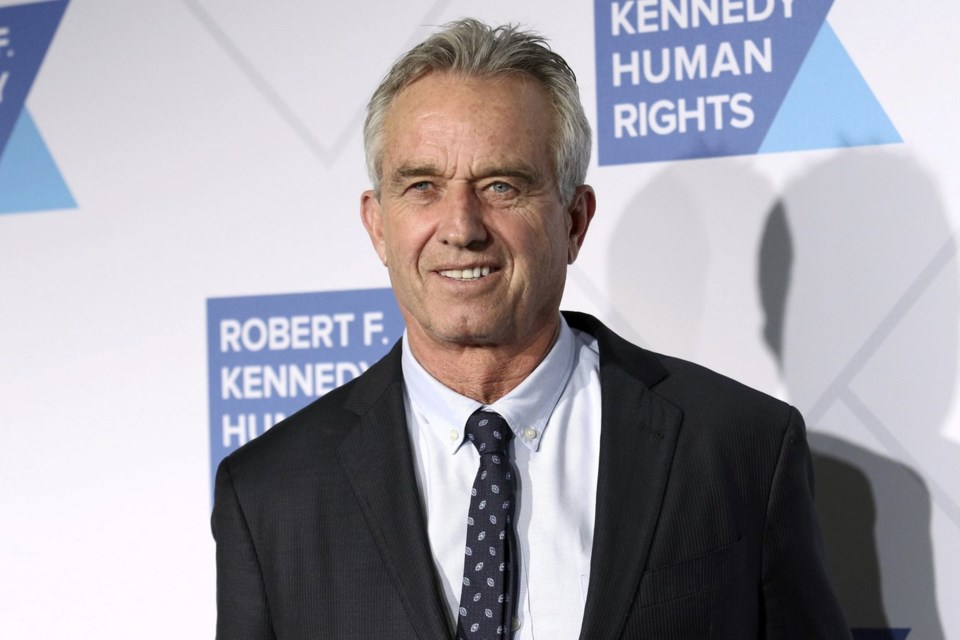RALEIGH, N.C. (AP) — can remain on North Carolina's presidential ballots after a state judge on Monday refused to block printing his name and those of other candidates of the “We the People” party that was recently certified by the State Board of Elections.
Wake County Superior Court Judge Keith Gregory rejected the preliminary injunction request by the North Carolina Democratic Party, which challenged the board's decision last month that declared We the People an official party.
Separately late Monday, a federal judge halted the board's rejection of official party status for another political group — Justice for All — that collected signatures to put progressive activist and professor on the presidential ballot. U.S. District Judge Terrence Boyle told the board to declare Justice for All of North Carolina an official party and to accept its candidates for the fall ballot.
The board had voted 4-1 to recognize We the People, which has been used by Kennedy's supporters to get the environmentalist and author on the ballot in a handful of states. Kennedy otherwise promotes himself nationally as an independent. The decision came as a ’s inclusion on the ballot there, saying he’s a California resident.
Board staff last found We The People organizers turned in enough valid signatures from registered and qualified voters to exceed the petition threshold in state law, which is currently 13,865. Petition collectors also must inform the signers of the general purpose and intent of the proposed party.
Lawyers for We the People and the state said the board granted the certification properly, in keeping with rules approved by the General Assembly.
“You simply asked this court to look at the law and you said the state board didn’t violate it," Gregory told state attorney Terence Steed at the close of the nearly two-hour hearing. “I agree.”
seeking the board's decision be reversed. It accused Kennedy's campaign of using the We the People vehicle to evade the tougher standard that state law sets for independent candidates to get on the ballot — the collection of six times as many signatures.
Two of the board's Democrats joined the two Republicans in giving We the People official party status on July 16. But even one of those two Democrats — Chair Alan Hirsch — said at the time the We The People effort was "a subterfuge” and suggested the matter was ripe for a legal challenge.
Ray Bennett, a lawyer representing the Democrats in the lawsuit, pointed in court to We the People petition instructions stating the party's purpose was simply to create a new party to put Kennedy on the ballot. That's impermissible, Bennett said, and it would otherwise prompt all independent candidates to favor the easier political party signature process.
But Steed and Oliver Hall, a lawyer representing We the People, said the certification law contains no test that the election board must use to decide whether a new party's purpose is acceptable — rather, it simply must have one.
Hall also said removing We the People from the ballot would be an extraordinary action that violates voters' First Amendment rights.
A state Democratic Party spokesperson didn't respond Monday to an email seeking comment on Gregory's decision, which the judge planned to issue in writing later and could be appealed.
The Democratic lawyers had asked that Gregory act by the end of the week. State election officials have said that's when they needed all candidate names for fall ballot printing.
Democrats are worried Kennedy still has enough left-wing star appeal that he could , who was expected to be President Joe Biden until he dropped his reelection bid last month. Vice President Kamala Harris has since won the nomination.
The Justice for All litigation stemmed from the board's Democratic majority voting 3-2 to reject the group's petition for official party status.
Board staff said it had received more than 17,000 signatures for Justice for All. But Democratic board members questioned how most of the signatures turned in were collected, including those sought by an outside organization called People Over Party. Board staff said dozens of voters whose names were on that list of signatures said they didn’t sign the petition or didn’t know what it was for. And the board said potentially fraudulent signatures were being investigated.
Boyle ruled the board went too far in throwing out the entire petition request. He said People Over Party submitted documents showing how it complied with the petition law. As for allegations of fraud, the board could have simply removed the signatures from counties where many reports originated, subtracting them from the total.
“The Board effectively disenfranchised over 17,000 North Carolina voters who signed petitions to certify JFA as a new political party on flawed, highly suspect grounds,” Boyle wrote while declaring the plaintiffs were likely to win in court on their First Amendment claims. Boyle's ruling can also be appealed.
Justice for All of North Carolina co-chair Italo Medelius praised Boyle's decision, saying Tuesday that it's "not just a win for JFA but a victory for every North Carolinian who believes in the power of choice and the strength of democracy.”
Kennedy’s campaign has said he is officially on the ballot in 17 states and signatures have been submitted in 23 more. The West campaign said Tuesday it has enough signatures and party nominations needed to get on the ballot in 16 states.
Gary D. Robertson, The Associated Press




